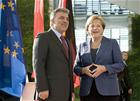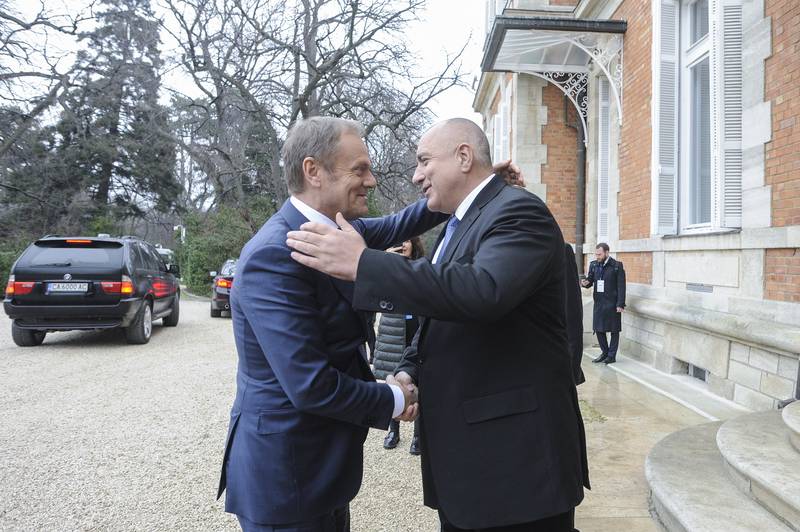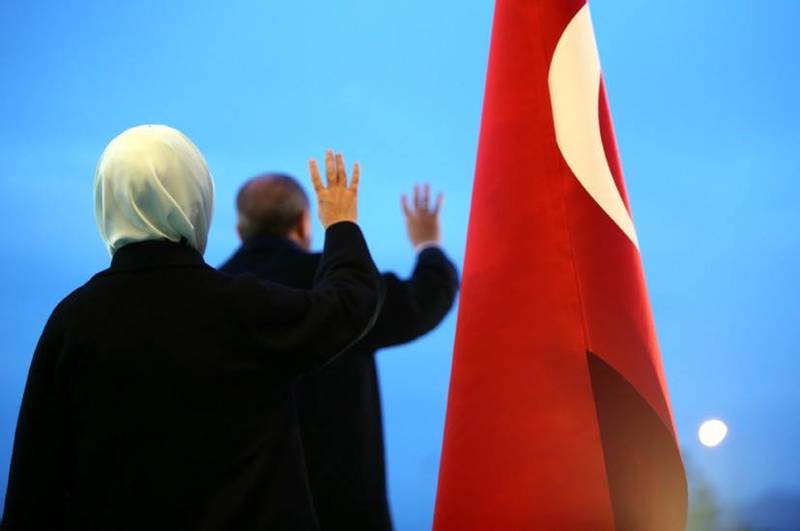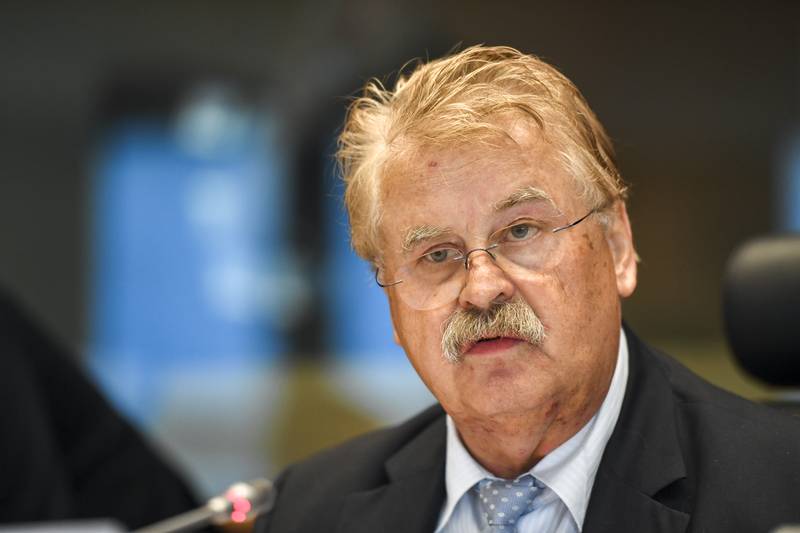Turkey Wants to Complete Negotiations But It Is Not Clear if It Wants to Join the EU
Ralitsa Kovacheva, September 24, 2011
 "I am of the conviction that the ongoing debates about whether Turkey should be a member of the EU are most inappropriate. What is to be done is to give Turkey the opportunity to conclude its negotiations process. I do not know but when that day comes, I and the Turkish people, we may say we do not want to join the EU."
"I am of the conviction that the ongoing debates about whether Turkey should be a member of the EU are most inappropriate. What is to be done is to give Turkey the opportunity to conclude its negotiations process. I do not know but when that day comes, I and the Turkish people, we may say we do not want to join the EU."
Doubts that the Turkish aspiration for EU membership is not as strong as it was 10 years ago, have long been felt as in Turkish society itself, so by external observers. The idea that even if the negotiations were concluded Turkey might refuse to join the Union, like Norway did, had been launched by Turkish diplomats some time ago and was now confirmed in the plain text by Turkish President Abdullah Gul in Berlin.
The new self-confidence of Turkey
Moreover, at a joint press conference with his German counterpart, Christian Wulff, President Gul explained that he would not accept any alternatives to full membership. “We find it difficult to understand the relationship of a special quality. We have been in the customs union since 1996. We entered that partnership because we had the courage to and we are competing now. What kind of special relationship we can have beyond that is a bit difficult to understand," Gul said, quoted by Turkish TV channel TRT. He stated that the EU membership was a "strategic objective" which Turkey would not give up.
On his way to Germany, Mr Gul told the accompanying journalists: "If they ignore Turkey, Europe will be the one that loses," EurActiv wrote. His confidence is justified, given the economic upswing of the country and its political influence. Gul himself commented that "Germany and Turkey are the only healthy countries of Europe" and the role of Turkey in international politics was "as important as the whole EU".
In support of Mr Gul's words, the same day when Italy was downgraded by Standard & Poor's (20 September) the agency raised Turkey’s local-currency credit rating to investment grade. The decision reflects the improvements in Turkey's financial sector and the expansion of local debt markets.
Germany: Turkey is an important partner, but we do not want it in the EU
On the eve of her meeting with the Turkish president, however, German Chancellor  Angela Merkel once again declared she was against Turkey's full EU membership. "We are against the full EU membership of Turkey but we don’t want to lose such an important companion," Merkel said at a CDU party conference. After her meeting with Abdullah Gul, the chancellery published a short protocol message, which only stated that both leaders have discussed political developments in North Africa and the Arab world, Turkish EU membership and bilateral relations. Germany is the most important trade partner of Turkey, the largest foreign investor and first in number of tourists to Turkey - 4.4 million, the statement said.
Angela Merkel once again declared she was against Turkey's full EU membership. "We are against the full EU membership of Turkey but we don’t want to lose such an important companion," Merkel said at a CDU party conference. After her meeting with Abdullah Gul, the chancellery published a short protocol message, which only stated that both leaders have discussed political developments in North Africa and the Arab world, Turkish EU membership and bilateral relations. Germany is the most important trade partner of Turkey, the largest foreign investor and first in number of tourists to Turkey - 4.4 million, the statement said.
 The four-day visit of President Gul in Germany was specially planned to coincide with the 50th anniversary of the Turkish-German labour recruitment agreement which paved the way for Turkish guest workers to Germany. 50 years later, nearly 3 million Turks live in Germany and the problem of their integration into German society is not only unresolved but sharpened, contributing significantly to the negative attitude of West Europeans to the Turkish EU membership.
The four-day visit of President Gul in Germany was specially planned to coincide with the 50th anniversary of the Turkish-German labour recruitment agreement which paved the way for Turkish guest workers to Germany. 50 years later, nearly 3 million Turks live in Germany and the problem of their integration into German society is not only unresolved but sharpened, contributing significantly to the negative attitude of West Europeans to the Turkish EU membership.
Abdullah Gul advised the Turks in Germany to learn German, and Germany in  turn to lift visa restrictions for Turkish nationals - a topic raised by all Turkish officials during their visits to the EU. The Zaman newspaper quoted Gul as saying that "speaking fluent German doesn't mean not being able to speak your own language" and that he believed multilingualism was a means of improving integration. Deutsche Welle, however, recalls that Turkey has criticised the German requirement since 2007 onwards every Turkish citizen, coming to Germany following marriage, to pass a language test in order to be allowed to live in the country.
turn to lift visa restrictions for Turkish nationals - a topic raised by all Turkish officials during their visits to the EU. The Zaman newspaper quoted Gul as saying that "speaking fluent German doesn't mean not being able to speak your own language" and that he believed multilingualism was a means of improving integration. Deutsche Welle, however, recalls that Turkey has criticised the German requirement since 2007 onwards every Turkish citizen, coming to Germany following marriage, to pass a language test in order to be allowed to live in the country.
Turkey is already looking to the east
Many of the big European media commented the statements of Abdullah Gul in Berlin as a clear sign that Turkey had already said goodbye to Europe. At the same time, the country is clearly looking to the east, expressing unequivocally its intention to become a regional leader in the Middle East. This vision was presented by Foreign Minister Ahmet Davutoglu in an interview with The New York Times on the eve of President Gul's visit to Germany. He predicted an alliance between Turkey and Egypt, which to be "an axis of democracy of the two biggest nations in our region, from the north to the south, from the Black Sea down to the Nile Valley in Sudan."
 But "for democracy, we need a strong economy," Davutoglu said and his words were not unfounded. During his latest visit to Cairo recently Turkish Prime Minister Recep Tayyip Erdogan was accompanied by a 280-member business delegation where contracts for 1 billion dollars were signed for a single day. According to Davutoglu, Turkish investments in Egypt will increase from the current 1.5 billion dollars to 5 billion dollars in the next two years, and the trade volume will reach 10 billion dollars by 2015.
But "for democracy, we need a strong economy," Davutoglu said and his words were not unfounded. During his latest visit to Cairo recently Turkish Prime Minister Recep Tayyip Erdogan was accompanied by a 280-member business delegation where contracts for 1 billion dollars were signed for a single day. According to Davutoglu, Turkish investments in Egypt will increase from the current 1.5 billion dollars to 5 billion dollars in the next two years, and the trade volume will reach 10 billion dollars by 2015.
In order to demonstrate its support for the democratic changes in the region, while easing suspicions for its own government’s authoritarian aspirations, Turkey has distanced itself from the regime of Bashar Assad in Syria, with whom it has long maintained close relations. Obviously, with a booming economy and its effective foreign policy the country is not only willing but capable to become a regional leader and Europe will need this ally. As noted by participants in the discussion on the EU-Turkey relations, which we in euinside have organised in July, there are some current issues where the EU and Turkey can cooperate and make progress, bypassing the blocked negotiations - namely the Arab Spring is a good reason for such a pragmatic approach .
The question is what the EU and Turkey expect from each other and if they are capable of finding a way for constructive relations, despite the frozen negotiations and moreover, regardless of their outcome.
 Donald Tusk, Boyko Borissov | © Council of the EU
Donald Tusk, Boyko Borissov | © Council of the EU | © Turkey Presidency
| © Turkey Presidency Elmar Brok | © European Parliament
Elmar Brok | © European Parliament